Key takeaways
- Local grassroots efforts are essential for Republican campaigns, with activists building strong community connections and fostering trust.
- Effective messaging that resonates with local concerns helps campaigns feel authentic and engage voters meaningfully.
- Challenges include balancing activist schedules, managing differing viewpoints, and sustaining enthusiasm over time.
- Building relationships with activists through genuine curiosity, consistent follow-ups, and shared personal stories fosters stronger connections and collaboration.
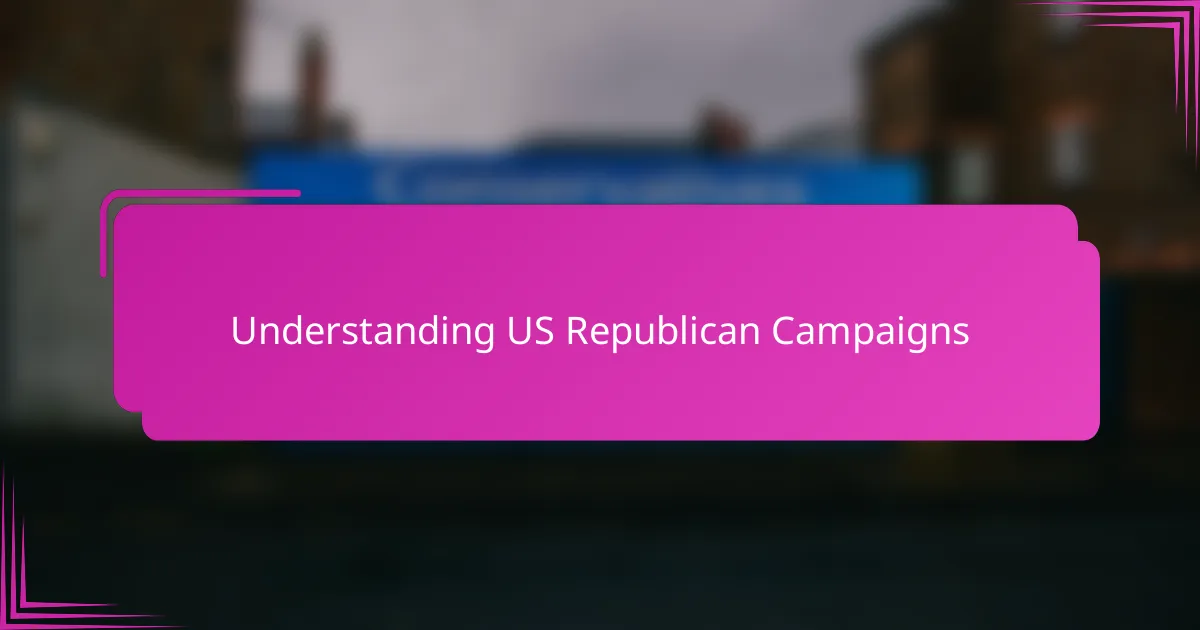
Understanding US Republican campaigns
When I first started paying attention to US Republican campaigns, I was struck by the emphasis they place on local grassroots efforts. It made me wonder: how much impact can a few committed activists really have? From what I’ve seen, these campaigns thrive on building strong connections within communities, relying on volunteers who genuinely believe in the cause.
One thing I’ve noticed is how strategic messaging plays a critical role in shaping public opinion. Republican campaigns often focus on core values like economic freedom, national security, and smaller government. But it’s not just about the slogans—they tailor their messages to resonate with local concerns, which makes their outreach feel authentic rather than generic.
What stands out to me is the blend of tradition and adaptability. Many activists I’ve met are deeply rooted in party history, yet they’re quick to adopt new tactics like data-driven targeting and social media engagement. It’s a dynamic mix that keeps these campaigns both grounded and relevant. Don’t you think this balance is what gives the party its staying power in diverse regions?
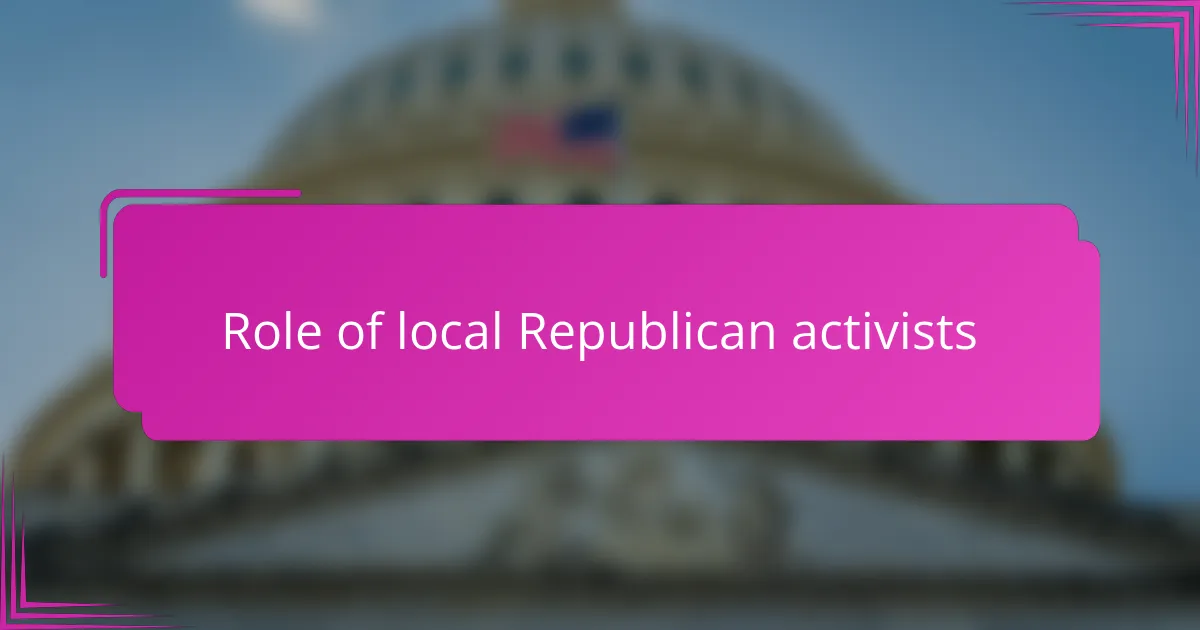
Role of local Republican activists
Local Republican activists are the backbone of any campaign, in my experience. They’re not just volunteers; they’re neighbors, friends, and community members who bring passion and local knowledge to the table. I’ve seen how their enthusiasm can energize a whole neighborhood, turning passive voters into active supporters.
What I find fascinating is how these activists wear multiple hats—organizers, communicators, and even local policy advocates. Their role goes beyond knocking on doors; they’re connectors who translate national party goals into relatable local stories. Have you ever witnessed a volunteer passionately explaining how Republican principles directly affect their town? It’s quite inspiring.
From what I’ve observed, the effectiveness of campaigns often hinges on these activists’ ability to foster trust and genuine dialogue. They’re the ones who listen, adapt, and sometimes bridge gaps between the party’s platform and the diverse views within communities. Without their efforts, a campaign’s message might just feel like noise rather than a call to action.
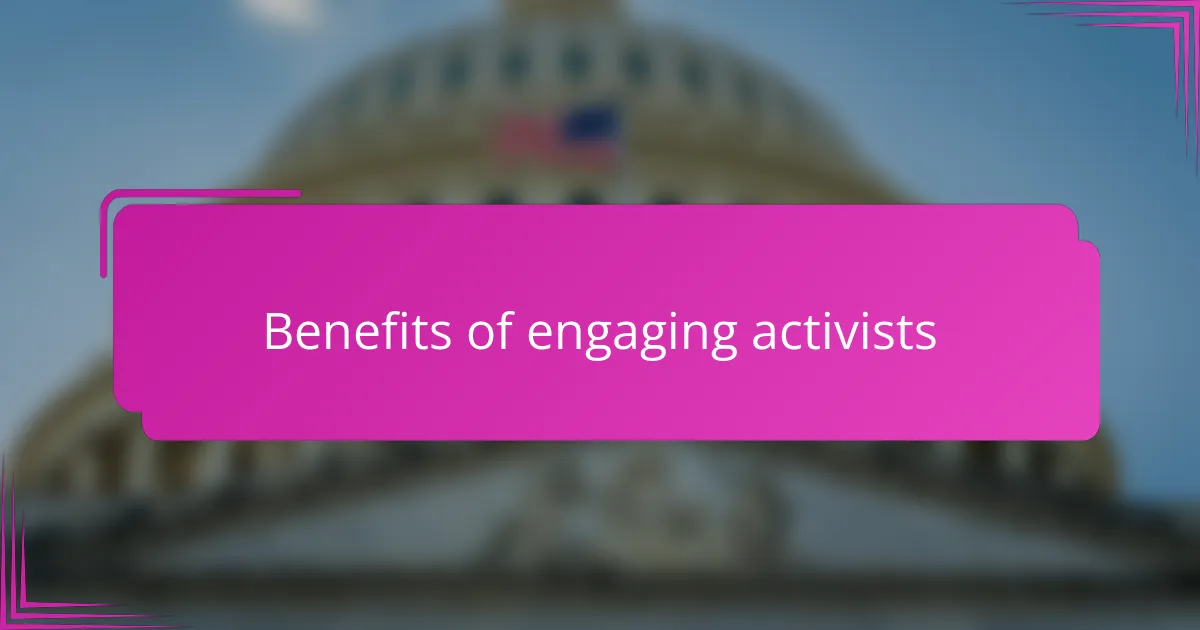
Benefits of engaging activists
Engaging with local activists brings a clear energy boost to any campaign I’ve been part of. Their firsthand knowledge of neighborhood concerns means the campaign never feels detached or out of touch. Have you ever noticed how a simple conversation with a familiar face can turn a skeptical voter into a committed supporter? That’s the power activists hold.
Another benefit I appreciate is how activists amplify the reach of campaign efforts without blowing the budget. They’re passionate volunteers who spread the message through community events, social media, and everyday interactions. Their authentic voices create a ripple effect that paid advertisements simply can’t match.
Lastly, working closely with activists often uncovers fresh ideas and unanticipated solutions. When you’re in a room with people deeply connected to their locality, creative strategies naturally emerge. It reminds me how vital listening is—not just speaking—in successful grassroots campaigns. Isn’t that kind of collaboration what makes a movement truly thrive?
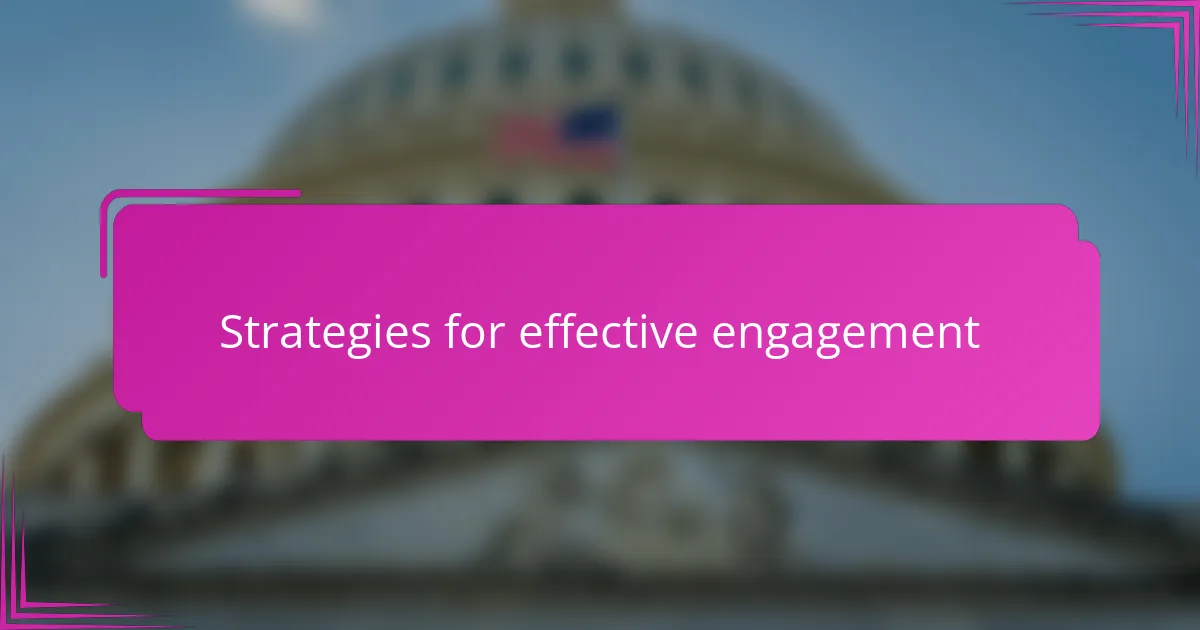
Strategies for effective engagement
One strategy I find essential is meeting activists where they are—both physically and ideologically. I remember attending a neighborhood meet-and-greet where simply showing up and listening opened doors I didn’t expect. Have you ever noticed how people respond when they feel genuinely heard? It transforms interactions from transactional to transformational.
Another tactic is leveraging storytelling that connects Republican principles to everyday experiences. When I heard an activist share how smaller government helped a local family thrive, it wasn’t just politics—it was a relatable narrative. How often do we overlook the power of a good story in our own campaigns? It’s a simple tool but incredibly effective.
Finally, consistency matters. Following up after events, checking in with volunteers, and maintaining a steady presence can build trust over time. I’ve learned it’s not the big gestures but the small, regular contacts that keep momentum alive. Doesn’t persistence show commitment more than any flashy ad ever could?
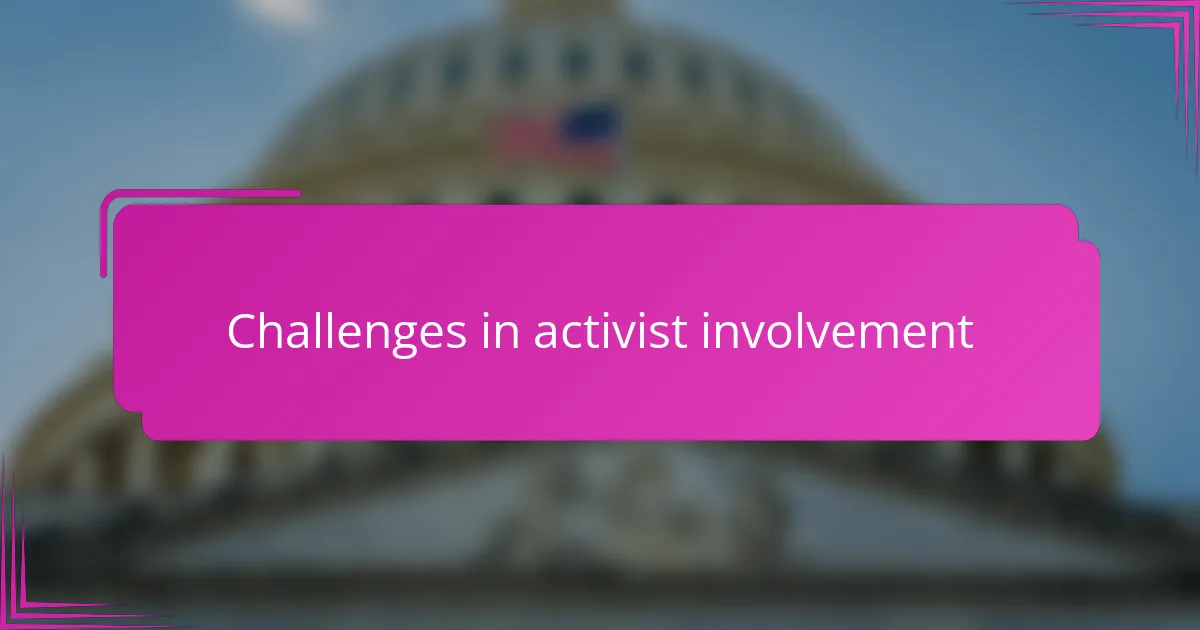
Challenges in activist involvement
Getting local activists truly involved isn’t always as straightforward as it seems. From my experience, one of the biggest hurdles is balancing their busy personal lives with campaign demands. I’ve met passionate volunteers who want to do more but struggle to find time, which can slow momentum and create frustration.
Another challenge I’ve noticed is managing differing viewpoints within the activist group itself. Even among committed Republicans, there can be strong opinions on strategy or messaging that occasionally lead to tension. Have you ever been in a meeting where everyone agrees on the goal but not on the how? It takes patience and empathy to keep everyone aligned.
Lastly, sustaining enthusiasm over the long haul is tough. Activists can start out fired up, only to feel burned out after repeated setbacks or slow progress. I recall a volunteer telling me, “Sometimes it feels like shouting into the wind.” That’s when reminding each other of the small wins becomes crucial to keep spirits high.

Personal experiences with activists
Meeting local Republican activists has been eye-opening for me. I remember one early morning canvassing session where a couple of volunteers shared stories about their families and communities, making the political work feel deeply personal. Have you ever noticed how those genuine moments turn abstract campaigns into something meaningful right in front of you?
Sometimes, I find myself inspired by the passion activists bring, even when discussions get heated. Once, during a strategy meeting, I witnessed a disagreement spark lively debate, yet the underlying respect kept everyone focused on the bigger picture. It made me think—doesn’t productive tension sometimes fuel progress better than easy consensus?
What strikes me most is how these activists carry a quiet resilience. I’ve chatted with volunteers who openly admitted feeling exhausted but still showed up week after week. It’s their commitment that reminds me why grassroots involvement matters so much—because real change grows from steady, heartfelt work, not just grand speeches.
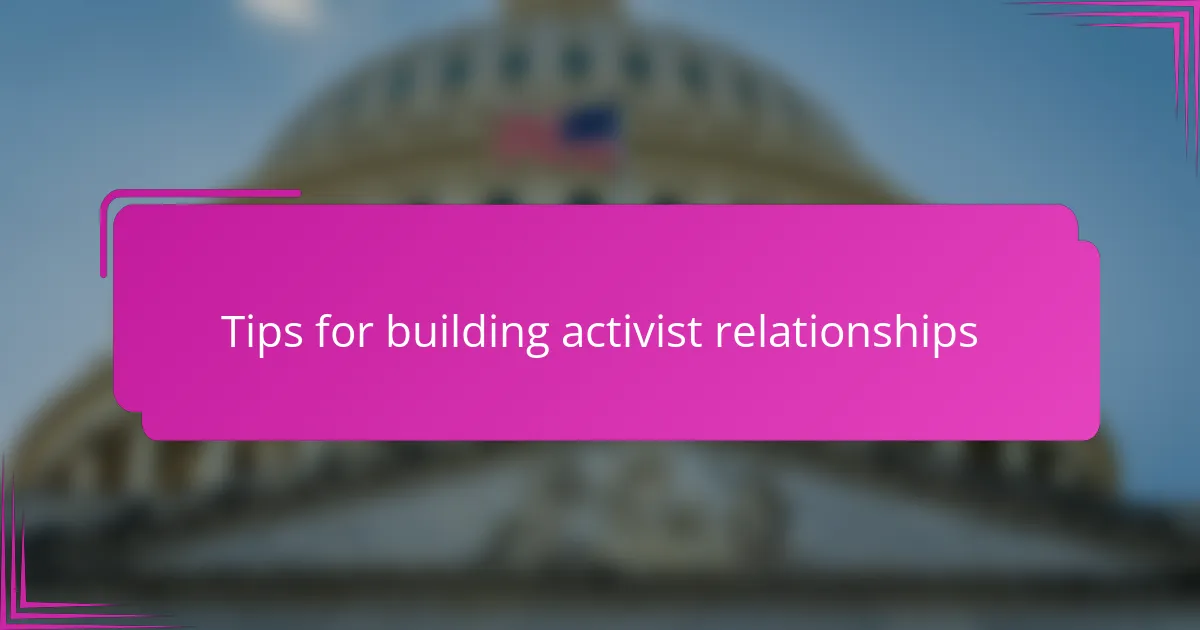
Tips for building activist relationships
Building strong relationships with local activists starts with genuine curiosity. When I first took the time to ask volunteers about their motivations and listen—not just hear—I noticed a shift from polite nods to energized conversations. Have you ever felt how a simple question can open deeper connections? That moment of true interest lays the foundation for trust.
I’ve also learned that showing up consistently makes a world of difference. One campaign I was involved in had a volunteer who always followed up with a quick call or message after meetings. It wasn’t flashy, but over time it built a sense of reliability that kept people engaged. Isn’t it fascinating how small, steady gestures often beat grand promises?
Lastly, I’ve found that finding common ground beyond politics helps relationships thrive. Sharing personal stories or celebrating local traditions creates bonds that survive debates and disagreements. When we recognize the person behind the activist, haven’t you noticed cooperation becomes less transactional and more heartfelt? Those moments remind me why grassroots work is so rewarding.